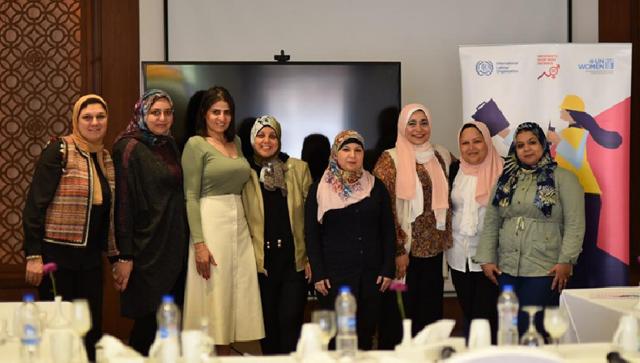You are here
ILO concludes violence and harassment training for stakeholders in Jordan, Palestine, Egypt
By JT - Dec 15,2021 - Last updated at Dec 15,2021

Participants pose for a group photo during the conclusion of a training organised by the International Labour Organisation for stakeholders in Jordan, Palestine, and Egypt on the implementation of Violence and Harassment Convention, 2019 (No. 190) in these countries (Photo courtesy of ILO)
AMMAN — The International Labour Organisation (ILO) concluded a training for stakeholders in Jordan, Palestine, and Egypt on the implementation of Violence and Harassment Convention, 2019 (No. 190) in these countries.
Organised in partnership with the International Training Centre of the ILO (ITCILO), the one-week training examined how violence and harassment are denied or ignored in light of limited availability of data on the two phenomena, according to an ILO statement issued on Tuesday.
Conducted by ITCILO specialists, the training looked into failure of some decision-makers and employers to take effective prevention steps, as well as lack of awareness of health and safety risks imposed by violence and harassment.
The participants, representing the government, employers, women’s rights organisations and labour unions, made recommendations for addressing violence and harassment in these countries, which have not ratified Convention C190 .
Recommendations included raising workers’ awareness of their rights and types of protection available; and empowering workers to report violence and harassment under effective complaints mechanism.
The participants proposed raising employers’ awareness of violence and harassment and the need for workplace prevention measures; lobbying decision-makers to influence policy-making; collecting data; conducting thorough research on violence and harassment; and building the capacity of legal specialists.
Convention C190 defines violence and harassment” in the world of work as “a range of unacceptable behaviours and practices, or threats thereof, whether a single occurrence or repeated, that aim at, result in, or are likely to result in physical, psychological, sexual or economic harm, and includes gender-based violence and harassment”.
It defines gender-based violence and harassment as “violence and harassment directed against persons on the basis of their sex or gender, or which disproportionately affects persons belonging to a certain sex or gender and includes sexual harassment”.
Reem Aslan, chief technical adviser for ILO Decent Work for Women Programme in Jordan, said protection of violence and harassment victims “is a top priority that requires creating an effective and safe mechanism to address complaints while protecting the identity of informants”.
“This cannot be achieved unless legislative shortcomings are addressed,” added Aslan, who is also a gender specialist.
“In general, violence and harassment have not received adequate attention, globally. There is a need for building a database to measure the magnitude of violence and harassment. The ILO is trying to accomplish this task globally, and in some Arab countries. The data will help identify the economic impacts of violence and harassment on individuals, enterprises and the country as a whole.”
Related Articles
AMMAN — The International Labour Organisation (ILO) has published a legal gap analysis in a bid to work on a legislative framework con
AMMAN — The International Labour Organisation (ILO) in Jordan together with national partners approved a private sector engagement plan, enc
AMMAN — Women activists and economists praised recent Parliamentary amendments for their envisioned role in safeguarding the well-being of f














